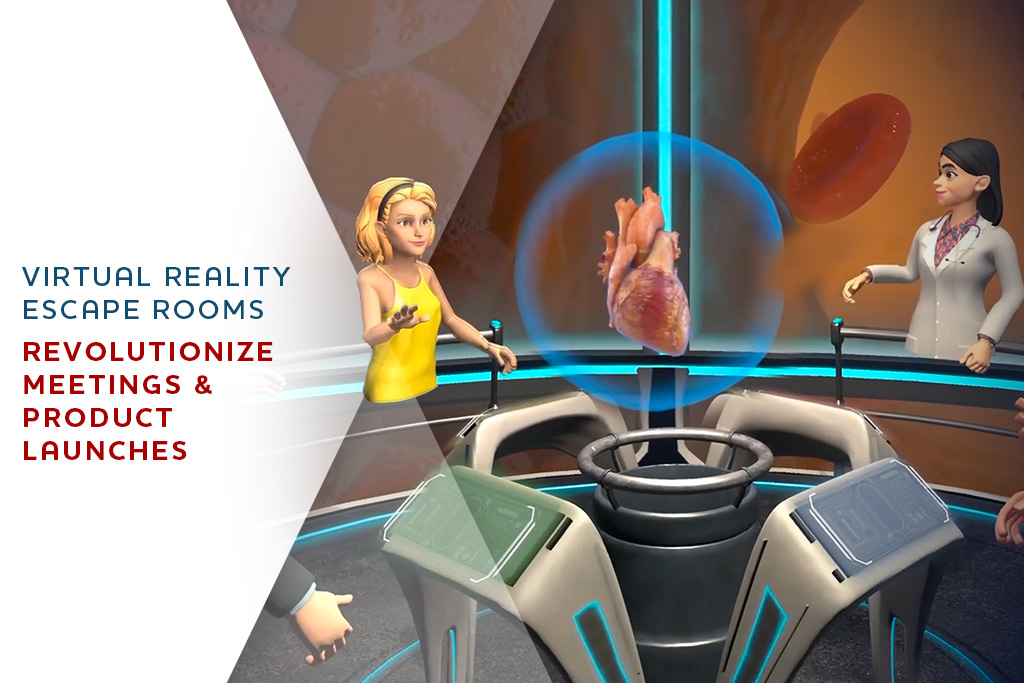Escape Rooms have evolved beyond entertainment, proving to be powerful tools for training and marketing by revolutionizing meetings, workshops, events, and even product launches, for life science companies of all sizes.
By simulating real-world scenarios, Escape Rooms enhance learning and retention, foster camaraderie and teamwork, and provide branded and customized learning environments relevant to the experience and skills of learners.
Escape Rooms are powerful tools for training and marketing, but when delivered in an experiential learning tool, like a program designed in Virtual Reality (VR), their impact multiplies, driving deeper engagement, retention, and practical value, due to the immersive nature of the experience. 1
The Expanding Escape Room Industry
The Escape Room market is growing rapidly, with projections estimating it will reach $31B by 2032. This growth is driven by the increased application of Escape Rooms to corporate training and marketing, particularly in industries like life sciences.2
Experiential Learning in Life Science Environments
Escape Rooms offer hands-on environments where participants apply theoretical knowledge to practical situations. In medical education and training, they’ve been used to replicate clinical scenarios, allowing students to practice diagnostic and treatment skills in a controlled setting.3
Consider this: Virtual Reality (VR) Escape Rooms can realistically simulate lab shutdowns, medical interventions, contamination incidents, regulatory walkthroughs, etc. without the risk of actually going through those scenarios in real life. Plus, VR Escape Rooms don’t require trainers to set up or stage an Escape Room in a physical space, they simply require a place for people to stand safely, like on a Virtual Reality mat, so learners can navigate the virtual terrain and connect with others through headsets.
Promoting Camaraderie and Teamwork
Regardless of whether the training is offered in person or in a Virtual Reality space, the simulations offered through Escape Room programs require collaboration, enhancing communication and interpersonal skills among participants. Studies have shown that Escape Rooms can improve teamwork and morale among life science trainees.4
Improving and Enforcing Compliance and Safety Protocols
Life science companies have also utilized Escape Rooms to reinforce good manufacturing practices. For instance, Orion Pharma implemented an escape room to help employees identify operational shortcomings, making compliance training more engaging.5
Detailing Concepts Too Difficult to Comprehend
Many pharmaceutical companies choose to develop Escape Rooms to illustrate complex scientific ideas, such as cancer research, providing an experiential learning environment for participants to deepen their understanding of more complex concepts.6
Why Virtual Reality (VR)-Based Escape Rooms?
The immersive nature of VR taps into active learning, narrative immersion, and sensory engagement, which are all drivers of deep learning and retention. When these experiences are thoughtfully designed, framed by narrative, and followed by reflection, they produce lasting outcomes.
- Deep Understanding through Full Immersion: VR Escape Rooms plunge participants into realistic, sensory-rich environments. For instance, a study showed a VR Escape Room teaching building energy simulations. Players can assemble walls using various materials, guided by interactive training tips, in a highly engaging, usable learning space.7
- Team Building Under Pressure: Corporate and educational VR Escape Rooms create fun and competition to significantly improve problem-solving, teamwork, time management, and executive functioning. All of these are vital skills required for life sciences training.8
- Structured, Measurable Learning Outcomes: In VR-powered educational Escape Rooms, problems align with specific learning objective(s). Evaluations before, during, and after training can accurately confirm retention gains and program efficacy.9 Companies simply cannot do this level of tracking nearly as accurately in a traditional Escape Room environment.
- Receiving Immediate Feedback and In-the-Moment Shifting: Furthermore, the virtual environment allows for analytics and metrics that companies just cannot access through traditional Escape Rooms. For instance, pre-, during, and post knowledge tests; observations of behavior; and team performance metrics not only evaluate both cognitive and behavioral changes, but they also provide immediate feedback that can be used to refine scenarios by changing program direction and/or narrative (i.e. applying AI functionality to create various scenarios), leveling up in difficulty (based on user ability), and more.
- Leadership Development: Some companies offer leadership-focused Virtual Reality Escape Rooms as part of broader training journeys to foster deeper trust, communication, critical thinking, and high-performing team dynamics.10
How VR Escape Rooms Revolutionize Product Launches, specifically:
As per the information provided above, VR Escape Rooms can dramatically elevate product launch(es) specifically by:
- Delivering scalable, cost-effective, and adaptable training modules and programs.
- Enhancing empathy and understanding through experiential learning.
- Creating hands-on, scenario-driven experiences to assist stakeholders in fully understanding complex product features, side effects, etc.
- Making training memorable, impactful, and behavior changing.
- Providing rich, actionable data.
Immersive Storytelling and Emotional Engagement
VR Escape Rooms allow brands to create stories and narratives where participants actively engage with the product’s impact on people. This hands-on involvement fosters a stronger emotional connection and enhances brand recall. For instance, VR experiences can simulate a scenario where users solve challenges using the product, effectively demonstrating its value in a memorable way.11
Interactive Product Demonstrations
Unlike traditional product demos, VR Escape Rooms enable users to interact with products in a simulated environment. This approach is particularly beneficial for highly complex or costly technical products, as it allows potential stakeholders to experience functionalities firsthand, leading to more in-depth, cost-effective, and efficient comprehension and decision-making.12
Enhanced Brand Visibility and Differentiation
By offering a unique and engaging experience, VR Escape Rooms help brands stand out in already saturated markets. They create buzz and attract attention, making product launches more impactful. This innovative approach to marketing can position a brand as forward-thinking and people-centric.
Accurate Data Collection and Insights
Experiential learning programs like VR Escape Rooms can be designed to track user interactions, providing valuable data on healthcare professional (HCP) and customer preferences and behaviors. Such insights can accurately inform future marketing strategies and product development, ensuring the products truly align with HCPs’ and customers’ concerns and needs.
Cost-Effective and Reusable
Compared to traditional physical setups, VR Escape Rooms often require less physical space and materials, leading to cost savings. They also offer the advantage of easy updates and modifications, allowing for continuous improvement without significant additional investment.13
Scalability and Accessibility
A Virtual Reality Escape Room can also be adapted to be used by individuals or companies who do not have access to headsets. These types of programs can easily be rendered for an individual to participate in the same activity on a tablet computer (like an iPAD) in lieu of a headset. They can also be deployed across various platforms, including in-store setups, online experiences, and mobile units. This flexibility ensures that a wider audience can participate, regardless of their location, thereby maximizing reach and engagement.
Companies may also want to consider how to make these types of programs ADA compatible and compliant to include various individuals who have different capabilities (i.e., an audio headset to describe what is happening in the VR Escape Room for a person with visual differences).
Conclusion
Escape Rooms offer life science companies innovative avenues for revolutionizing their meetings, workshops, events, and product launches.
Integrating VR with Escape Room mechanics presents a high-impact strategy for life science companies, whether for training, onboarding, or marketing.
By providing immersive, experiential learning options, like VR Escape Rooms to their programs, they enhance learning and retention, build efficient teams, and create highly memorable brand interactions.
As life science verticals continue to grow consistently year over year, the application of VR-based Escape Rooms is poised to become even more prevalent and, therefore, the companies who choose these innovative and revolutionary programs will gain spots at the ‘top of the leaderboard’ in their industries.
Citations / References
- Alkharashi M. Comparing experiential versus conventional learning on knowledge retention for teaching surgery to medical graduates. Saudi J Ophthalmol. 2020 Dec 28;34(2):107-110. doi: 10.4103/1319-4534.305042. PMID: 33575531; PMCID: PMC7866721.
- Allied Market Research. Escape Room Market Expected to Reach $31 Billion by 2032. CG : Entertainment Products. Jun 2023. Report Code: A85137. Pages: 250.
- Shrivastava SR, Shrivastava PS, Joshi A. Escape Rooms in Medical Education: Unlocking Realistic Simulated Clinical Scenarios Using Interprofessional Education. J Pharm Bioallied Sci. 2024 Jul;16(Suppl 3):S2938-S2940. doi: 10.4103/jpbs.jpbs_1234_23. Epub 2024 Mar 5. PMID: 39346475; PMCID: PMC11426584.
- Guckian J, Eveson L, May H. The great escape? The rise of the escape room in medical education. Future Healthc J. 2020 Jun;7(2):112-115. doi: 10.7861/fhj.2020-0032. PMID: 32550277; PMCID: PMC7296573.
- Turpeinen, Anni. Good manufacturing practices are revised in an escape room – emotional memories promote learning. We are Orion Pharma. 11/11/2022. Copyright Orion Corporation. Company code, VAT 19992126.
- Wilby, Kyle & Kremer, Lisa. (2020). Development of a cancer‐themed escape room learning activity for undergraduate pharmacy students. International Journal of Pharmacy Practice. 28. 10.1111/ijpp.12622.
- Arbesser-Rastburg, Georg; Saeed Safikhani, Matej Gustin, Christina Hopfe, Gerald Schweiger, Johanna Pirker. Project Beyond: An Escape Room Game in Virtual Reality to Teach Building Energy Simulations. Cornell University. 8 Jul 2024. arXiv:2407.02981v2 [cs.HC].
- Yang, Y., Dwyer, T., Wybrow, M., Lee, B., Cordeil, M., Billinghurst, M., … & Thomas, B. H. (2022). Towards immersive collaborative sensemaking. Proceedings of the ACM on Human-Computer Interaction, 6(ISS), 722-746. https://doi.org/10.1145/3567741
- Antoniou PE, Papamalis F, Dafli E, Poultourtzidis I, Schwarz D, Woodham L, Dimitriadis S, Tagaras K, Kyriakidis N, David P, et al. Medical Education Escape Room Aligned with Flipped Classroom and Powered by Mobile Augmented Reality. Electronics. 2024; 13(12):2367. https://doi.org/10.3390/electronics13122367
- GP Strategies. Virtual Reality Leadership Escape Room. ©2025 GP Strategies Corporation. All Rights Reserved. Part of Learning Technologies Group ltg.
- Chang S, Suh J. The Impact of Digital Storytelling on Presence, Immersion, Enjoyment, and Continued Usage Intention in VR-Based Museum Exhibitions. Sensors (Basel). 2025 May 5;25(9):2914. doi: 10.3390/s25092914. PMID: 40363352; PMCID: PMC12074510.
- Yangpeng Xin, Ying Zhou, Le Yang, Yuanyuan Liu, Tan Tan, Enhancing healthcare environment design evaluations through an interactive virtual reality-based approach: A design science research, Developments in the Built Environment, Volume 18, 2024, 100440, ISSN 2666-1659.
- O’Connor, John, ESCape the ClassRoom. 2024. 2408.08273, arXiv, cs.HC, https://arxiv.org/abs/2408.08273.

![[Approved] Enhancing Cardiology Device Launches Through XR [2026]](https://tipmedia.com/wp-content/uploads/2026/02/blog_feb_2-3.jpg)

